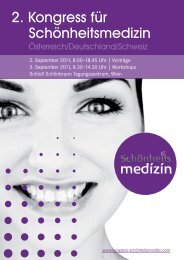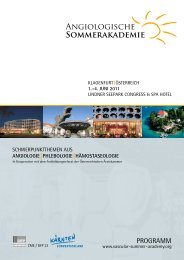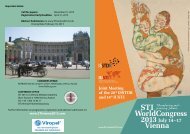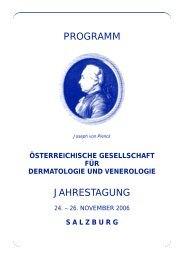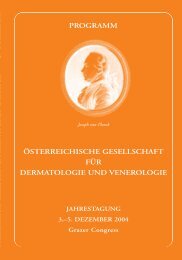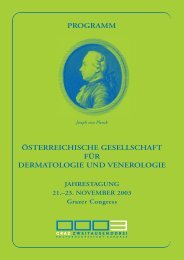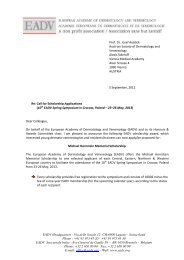PROGRAMM JAHRESTAGUNG 2012 30. Nov. – 2. Dez ... - ÖGDV
PROGRAMM JAHRESTAGUNG 2012 30. Nov. – 2. Dez ... - ÖGDV
PROGRAMM JAHRESTAGUNG 2012 30. Nov. – 2. Dez ... - ÖGDV
Erfolgreiche ePaper selbst erstellen
Machen Sie aus Ihren PDF Publikationen ein blätterbares Flipbook mit unserer einzigartigen Google optimierten e-Paper Software.
Freie Vorträge<br />
FV 3<br />
A novel recessive PAPA-like syndrome responsive to Canakinumab<br />
Alexandra Geusau 1<br />
Nadine Mothes-Luksch 1<br />
Hesam Nahavandi 2<br />
Winfried F. Pickl 3<br />
Carol A. Wise 4<br />
Zahra Pourpak 5<br />
Elisabeth Ponweiser 6<br />
Leopold Eckhart 7<br />
Raute Sunder-Plassmann 6<br />
1 Department of Dermatology, Division of Immunology, Allergy and Infectious Diseases<br />
(DIAID), Medical University of Vienna, Austria<br />
2 Medical Department, Hanusch Hospital, Vienna, Austria<br />
3 Institute of Immunology, Medical University of Vienna, Austria<br />
4 Sarah M. and Charles E. Seay Center for Musculoskeletal Research, Texas Scottish Rite<br />
Hospital for Children, Dallas, TX, USA<br />
5 Immunology, Asthma and Allergy Research Institute, Tehran University of Medical<br />
Sciences, Tehran, Iran<br />
6 Department of Laboratory Medicine, Medical University of Vienna, Austria<br />
7 Department of Dermatology, Research Division of Biology and Pathobiology of the<br />
Skin, Medical University of Vienna, Austria<br />
Introduction: Pyogenic arthritis, pyoderma gangrenosum, and acne, i.e. PAPA<br />
syndrome (OMIM 604416), is a rare autosomal dominant inherited autoinflammatory<br />
syndrome, characterized by pyogenic sterile arthritis less frequently accompanied by<br />
pyoderma gangrenosum, and acne. Previously reported cases of PAPA syndrome were<br />
associated with dominant missense mutations in the proline serine threonine<br />
phosphatase-interacting protein 1 (PSTPIP1) gene localized on chromosome 15.<br />
PSTPIP1 has been suggested to be involved, amongst other processes, in the regulation<br />
of interleukin-1 beta processing.<br />
Methods: We diagnosed a patient with features of PAPA syndrome but with emphasis<br />
on cutaneous manifestations including pyoderma gangrenosum and acne fulminans-<br />
The PSTPIP1 gene of the patient and his extended family was sequenced. The patient<br />
was treated with Canakinumab, a human anti-interleukin-1 beta monoclonal antibody.<br />
Results: DNA sequence analysis of the patient revealed a homozygous nucleotide<br />
exchange c.773G>C in the PSTPIP1 gene leading to the substitution of glycine 258 by<br />
alanine (p.Gly258Ala). Heterozygous changes at the same nucleotide were identified<br />
in both of the patient's parents and in seven other family members, each of them<br />
asymptomatic. Treatment with Canakinumab led to rapid remission of the symptoms.<br />
In conclusion, our study provides evidence of a novel PAPA-like syndrome, an<br />
autoinflammatory disorder with a recessive inheritance pattern. PAPA and PAPA-like<br />
syndromes appear to have great variations in the expression of clinical phenotypes.<br />
Importantly, this is the first reported instance worldwide of a patient with PAPA-like<br />
syndrome successfully treated with an anti-IL-1beta monoclonal antibody.<br />
25



